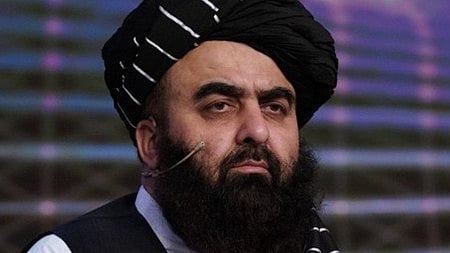Taliban's Gender Bias On Display In New Delhi Press Conference, Sparks Outcry
During Afghanistan’s Foreign Minister Amir Khan Muttaqi’s Delhi visit, women journalists were excluded from his press conference, reflecting the Taliban’s ongoing gender discrimination. The move drew widespread criticism from Indian opposition, journalists, and women’s groups, highlighting the clash between Taliban policies and India’s commitment to women’s rights.

Afghanistan Foreign Minister Amir Khan Muttaqi | File Pic
By not inviting or denying entry to women journalists at a press conference of Afghanistan’s Foreign Minister and Taliban leader, Amir Khan Muttaqi, in New Delhi on Friday, the Afghanistan establishment has, once again, shown its true colours on gender issues. The press conference took place after a bilateral meeting between Muttaqi and India’s Foreign Minister S. Jaishankar. Ever since the Taliban, the militant-political movement that swears by a strict code of Islamic law, took charge of the country for the second time in 2021, Afghan women have been stripped of virtually all rights, including the right to work and study, visibility, especially in public spaces, opportunity for healthcare, and even independent mobility.
That the Taliban has been unapologetically—in fact, brazenly—invisibilising women in the country has drawn criticism from liberal democracies around the world, but it has not impeded the Taliban’s efforts to re-establish diplomatic and strategic ties with these nations. Muttaqi’s week-long visit to India is a part of the Taliban’s self-rehabilitation outreach. However, in invoking its own unpardonable code about women on Indian soil, albeit within the precincts of its embassy, Foreign Minister Muttaqi crossed a line that he should have been sensitive to and respected. Instead, he coalesced the public apprehension, propagated by India’s Hindu right, that far-right Muslims do not think twice about imposing the Shariah when in power.
Despite the issues with women’s safety or development matrices in parts of India, it is a country that assures all its women of constitutional and human rights on par with men. To employ its restrictive code about women in India meant that the Afghanistan establishment was ready for the backlash but persisted. India’s Ministry of External Affairs figuratively shrugged about the incident, clarifying that it had nothing to do with the press conference, but it did not condemn the exclusion of women journalists. It missed the opportunity to show the Taliban that the restrictive and regressive Islamic code is not acceptable to the Indian government. And thereby hangs a question.
However, India’s opposition parties, guilds of journalists and editors, and women’s groups took to social media, mainstream news platforms, and other avenues to make their condemnation heard loud and clear. As many pointed out, the Indian men should have refused to play along and stood up for their women colleagues. Perhaps stung by the criticism, the Afghanistan establishment organised an “inclusive” press conference on Sunday—feeble damage control more than the recognition of women as equals. The Taliban’s view of women has no place in India, not even at a press conference. By not unequivocally condemning the exclusion of women journalists, the Government of India displayed unnecessary pussyfooting. Resuming business with the Taliban-led Afghanistan does not have to mean bending over backwards to humour its views about women.
Published on: Monday, October 13, 2025, 12:31 PM ISTRECENT STORIES
-
-
-
-
-